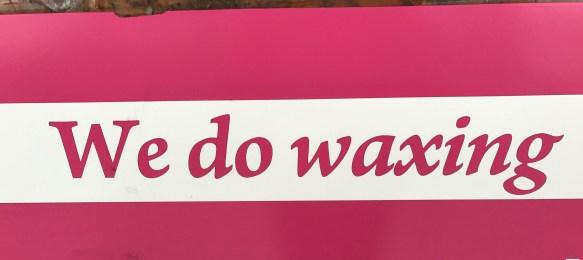Judging by the signs I’ve spotted recently, merchants are hoping you’ll purchase fashionable holiday attire — for your furniture. An example:
 Surely you weren’t planning on ushering guests into a room with a naked table! A four-legged pair of jeans would do nicely for a hip, can’t-be-bothered-to-dress-up dinette set. An evening gown with a very wide skirt saves formal hosts from the embarrassment of an underdressed eating surface. No hint from the shopkeeper about what sort of “table clothes” are available. If the customer isn’t pleased with the styles on sale, “sheets” could possibly preserve the table’s modesty.
Surely you weren’t planning on ushering guests into a room with a naked table! A four-legged pair of jeans would do nicely for a hip, can’t-be-bothered-to-dress-up dinette set. An evening gown with a very wide skirt saves formal hosts from the embarrassment of an underdressed eating surface. No hint from the shopkeeper about what sort of “table clothes” are available. If the customer isn’t pleased with the styles on sale, “sheets” could possibly preserve the table’s modesty.
Sheets, by the way, seem to tangle when they encounter signs, much as they do in a washing machine:

My bed has lumps, but no bedbugs or a single “pillow sheet.” How about yours? Maybe a “pillow sheet” would be a good gift.
Still in the linen closet, I’ll move on to the next sign, trying not to cry that the apostrophe rule has crashed and burned once again:

The apostrophe give a sheet possession of the “sale,” which, judging by the price but not the quality of the merchandise, is a pretty good deal. Why is it that so many people persist in thinking that an apostrophe creates a plural? Theories welcome.
I’m obviously stressed about punctuation, and this sign didn’t help:
 The bullet point in front of “house” was odd because there were no other items on the sign, hence no bulleted list. But if I’m opting to tinker with punctuation, I’m going for a comma after “house.” That comma would create a direct address statement appropriate to this holiday season: “House, hold items [so I don’t have to].” See? Shopping-stress relief!
The bullet point in front of “house” was odd because there were no other items on the sign, hence no bulleted list. But if I’m opting to tinker with punctuation, I’m going for a comma after “house.” That comma would create a direct address statement appropriate to this holiday season: “House, hold items [so I don’t have to].” See? Shopping-stress relief!
Enough grammar quibbles. Focus on what’s important about Thanksgiving and other holidays:

Do what the sign says: “Enjoy you holiday.”




 Unanswered Question: What happened to the candlestick maker?
Unanswered Question: What happened to the candlestick maker?
 In my ignorance I was ready to impose an “unauthorized part of speech” penalty — until I looked up “creative” in the dictionary, which enlightened me to the fact that “creative” can be a noun applied to people who, well, create for a living: writers, artists, composers, and so forth. Apparently I’ve been a “creative” for decades and never knew it.
In my ignorance I was ready to impose an “unauthorized part of speech” penalty — until I looked up “creative” in the dictionary, which enlightened me to the fact that “creative” can be a noun applied to people who, well, create for a living: writers, artists, composers, and so forth. Apparently I’ve been a “creative” for decades and never knew it.



 Do you call the front desk for “boom service,” and if so, how much do you tip the guy who lowers the boom? How do you delivery a “jobsite”? And what does a “boom service” showroom show?
Do you call the front desk for “boom service,” and if so, how much do you tip the guy who lowers the boom? How do you delivery a “jobsite”? And what does a “boom service” showroom show?

















